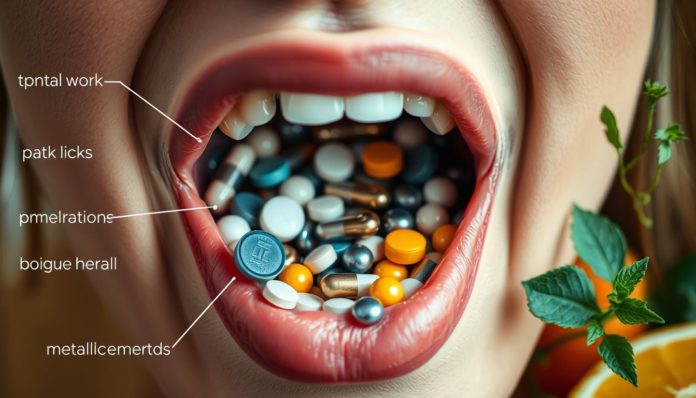Having a metallic taste in your mouth can be odd and change how your day goes. Knowing why you have a metallic taste in your mouth is key to fixing this strange feeling. It comes from many things, like certain pills, not keeping your mouth clean, and even being pregnant. It helps to know the causes of metallic taste in the mouth so you can figure out the cause and learn how to lose the metallic taste in your mouth.
Some drugs like antibiotics, allergy meds, and vitamins with iron or calcium can make your mouth taste metallic. Changes in hormones when you’re pregnant can do it too, often early on. Being around metals, or if your kidneys or liver aren’t working right, can also be the reason.
We’re about to explore more about what triggers this and how to fix it. So, stay with us.
Understanding the Basics of Metallic Taste in Mouth
Having a metallic taste in your mouth can be weird. But, getting to know what causes it can help. This feeling often starts with our taste buds. It is also linked to the sensory neurons in our brain. Let’s explore how these parts work and affect how we taste.

The Role of Taste Buds
Taste buds are small and found on our tongue. They help us detect flavors. They work by touching food molecules and telling the brain about tastes. Sometimes, things like medicine or being sick can mess this up. This might lead us to look for metallic taste in mouth treatment.
How Sensory Neurons Impact Taste
Sensory neurons are key in tasting flavors. They are in the olfactory system and help with taste. When hit by issues like infections, they can change how we taste. This is called parageusia. Knowing about sensory neurons helps us understand taste problems, like a metallic taste.
Common Medications Linked to Metallic Taste
Many prescription drugs and over-the-counter supplements lead to a metallic taste. We’ll look at the main causes and the medications involved.
Prescription Drugs and Their Side Effects
Prescription drugs like antihistamines, antibiotics, and blood pressure medications can cause a metallic taste. They change taste by mixing with your saliva. Heart and mental health drugs, like ACE inhibitors and some antidepressants, also have this side effect. Dry mouth, which these meds often cause, makes the taste issue worse.

Over-the-Counter Supplements
Over-the-counter supplements can also make your mouth taste metallic. Minerals like iron, calcium, and zinc are usual suspects. They change how things taste when they dissolve in your saliva. High doses or mixing these with other meds makes it more noticeable.
| Type of Medication | Examples | Common Side Effects |
|---|---|---|
| Antihistamines | Loratadine, Diphenhydramine | Dry mouth, drowsiness, metallic taste |
| Antibiotics | Metronidazole, Clarithromycin | Nausea, gastrointestinal issues, metallic taste |
| Blood Pressure Medications | ACE inhibitors, Beta-blockers | Dizziness, fatigue, metallic taste |
| Mineral Supplements | Iron, Calcium, Zinc | Constipation, nausea, metallic taste |
How Pregnancy Influences Taste Changes
Pregnancy brings many changes, especially in the early stages. One common but not often discussed thing is pregnancy taste changes. These are mostly due to hormonal shifts, with an increase in estrogen being a big factor. This can lead to dysgeusia, which varies in how much it affects daily life.
Many women talk about a metallic taste that changes how food tastes. This can be harder to deal with when also feeling sick, which is common early on. Even though this taste change is usually for a short time, there are metallic taste in mouth remedies to help with the discomfort.
- Consuming citrus fruits like lemons or oranges to neutralize the metallic taste.
- Maintaining good oral hygiene to reduce the intensity of the taste alteration.
- Opting for minty or herbal teas which can refresh the palate.
- Avoiding metal utensils and switching to plastic or wooden ones.
These taste changes often get better by the second trimester as hormone levels even out. By knowing why this metallic taste happens and using simple metallic taste in mouth remedies, moms-to-be can better deal with these changes. This way, they can still enjoy eating.
Impact of Poor Oral Hygiene on Taste
Maintaining oral hygiene is crucial beyond just a bright smile. It helps avoid dental problems. Poor oral care can cause a metallic taste in the mouth. This taste is highly unpleasant.
Consequences of Not Brushing and Flossing
Not brushing and flossing leads to plaque and bacteria growth. This results in tooth decay and bad breath. A lesser-known effect is the metallic taste caused by bacteria.
This metallic taste comes from bacterial activity in the mouth. It leads to unpleasant tastes and odors.
Gum Diseases and Their Effects
Gum disease comes from neglecting dental health. Conditions like gingivitis or periodontitis cause swollen, bleeding gums and a metallic taste. This taste persists and can affect how you perceive flavors.
Regular dental visits and proper care can prevent these issues. They help keep your taste buds and overall oral health in good shape.
| Oral Hygiene Practices | Impact on Taste |
|---|---|
| Brushing Twice Daily | Reduces risk of metallic taste. |
| Flossing Daily | Prevents gum disease, safeguarding taste buds. |
| Regular Dental Checkups | Early detection of problems, ensuring better taste perception. |
Sinus Infections and Upper Respiratory Issues
Dealing with sinus infections and upper respiratory issues can feel tough. Especially when they give you a metallic taste in your mouth. This strange taste comes from congestion and extra mucus. The mucus drains into the throat during these conditions. It changes how things taste to metallic or bad until you get better.
To treat this effectively, it’s vital to understand our body’s reaction to these infections. If you’re looking for a way to fix the metallic taste, focus on the root of the problem. That means treating the sinus infections or respiratory issues first. It highlights the need for a timely diagnosis and proper treatment.
The table below shows the causes and cures for a metallic taste. This taste comes from sinus infections and other respiratory problems.
| Condition | Cause | Treatment |
|---|---|---|
| Sinusitis | Inflammation and mucus buildup | Decongestants, antibiotics, and saline sprays |
| Common Cold | Excess mucus production | Rest, hydration, and over-the-counter medications |
| Allergic Rhinitis | Allergen-induced nasal congestion | Antihistamines and nasal corticosteroids |
Addressing the underlying causes is the first step in treating the metallic taste. Managing sinus infections or respiratory issues helps get your normal taste back. It makes life a bit better every day.
The Role of Zinc: Deficiency and Excess
Zinc is crucial for many body functions, including keeping our taste healthy. But if we have too little or too much zinc, our taste can be off. This is known as dysgeusia.
Studies reveal that zinc supplements can fix taste issues for those lacking zinc and others. A review of 12 trials with 938 people showed that 68 to 86.7 mg/day of zinc helps. These trials lasted up to six months. For more, read the full study here.
Zinc in our saliva is important for taste buds to work right. Not having enough, or having too much, can make things taste metallic. It can also make us feel sick to our stomachs. We need just the right amount of zinc.
Here’s how important this balance is:
| Condition | Impact on Taste | Recommended Zinc Intake |
|---|---|---|
| Zinc Deficiency | Increased risk of dysgeusia | 11 mg/day for men 8 mg/day for women (plus adjustments for age and pregnancy) |
| Excess Zinc | Metallic taste and gastrointestinal symptoms | Avoid exceeding 40 mg/day |
It’s essential to get the right amount of zinc. Too much or too little is bad. If taste changes don’t go away, seeing a doctor for a zinc check is a good idea. They can help adjust what you eat.
Chemotherapy and Cancer Treatments
Chemotherapy and other treatments for cancer often change how patients taste food. They might start to taste a metallic flavor in their mouths. This condition, known as “chemo mouth,” is common among people getting these treatments.
Why Does Chemotherapy Change Taste?
The main reason behind chemotherapy taste changes is the drugs used in cancer care. These drugs mix with the blood and mess up how taste buds, nerves, and the brain work together. This can make food taste metallic or just plain bad.
Managing Metallic Taste During Treatment
There are ways to deal with the metallic taste from treatment. Here are some helpful hints:
- Try eating cooler meals and steer clear of hot or spicy food.
- Use lemon or lime flavors in your food to hide the metallic taste.
- Keep your mouth clean to lessen the taste changes.
- Test out different spices and sauces to find what tastes best.
These tips are designed to help those with cancer treatment enjoy eating more. They aim to make food taste better in tough times.
Unraveling Pine Nut Syndrome
Pine nut syndrome puzzles doctors and food lovers. It usually starts 12 to 48 hours after eating pine nuts. People experience a persistent metallic taste.
It’s easy to think this taste is from an allergy. However, studies show it is not a typical allergic reaction.
The real cause of this metallic taste is still unknown. Research points to certain pine nuts from China as possible reasons. This unusual taste goes away after a few days or weeks when the body fully processes the nuts.
If you’re troubled by this metallic taste, stay hydrated and keep your mouth clean. Also, avoid eating pine nuts that might cause this problem. Knowing more about pine nut syndrome helps us understand taste better and its complex nature.
FAQ
What causes a metallic taste in the mouth?
Many things can cause a metallic taste in the mouth. This includes what you eat, medicines like antibiotics, and health problems. Poor dental health, pregnancy, and toxins in the environment can also be culprits.
How do taste buds function?
Taste buds help us detect flavors. They work with neurons to send taste info to the brain. But, if something’s off, like illness, you might get a metallic taste.
What role do sensory neurons play in taste?
Sensory neurons are key for taste and smell, sending signals to our brain. Trouble with these neurons, perhaps from meds or infections, might change taste. This can cause a metallic taste.
Which prescription drugs can cause a metallic taste?
Some prescription drugs, including certain antibiotics and mental health meds, can make your mouth taste metallic. This happens when their compounds mix with your saliva.
Can over-the-counter supplements cause a metallic taste?
Yes, taking supplements with minerals like iron or zinc can change how things taste. This might lead to a metallic taste in your mouth.
How does pregnancy influence taste changes?
In early pregnancy, hormonal changes might cause a metallic taste. This weird taste usually gets better by the second trimester and goes away after the baby is born.
What are the consequences of not brushing and flossing?
Not keeping up with oral hygiene can cause gum diseases like gingivitis. These issues often result in a metallic taste. Brushing and visiting the dentist can keep your taste normal and gums healthy.
How do gum diseases affect taste?
Gum diseases can make your mouth taste metallic by causing inflammation. Good oral care with brushing and flossing can stop these diseases and protect your sense of taste.
Can sinus infections cause a metallic taste?
Yes, sinus infections and breathing problems can lead to a metallic or bad taste. This will last until the infection clears up.
What is the role of zinc in taste perception?
Zinc helps keep our taste normal. But too little or too much can mess with how things taste, causing a metallic taste along with other problems like nausea.
How does chemotherapy affect taste?
Chemotherapy drugs mix with saliva and mess with taste buds and neurons. This leads to “chemo mouth,” where things taste metallic.
How can you manage a metallic taste during chemotherapy?
To deal with a metallic taste during chemo, try cooler foods. Adding sour flavors like lemon can also hide the bad taste.
What is pine nut syndrome?
Pine nut syndrome means a metallic taste starts within 12 to 48 hours after eating pine nuts. It’s a mystery why but it goes away after the nuts are digested.


